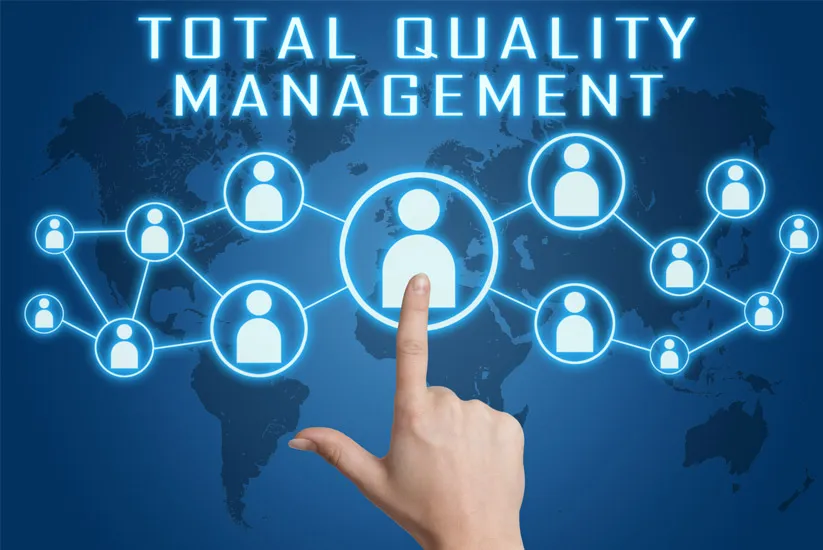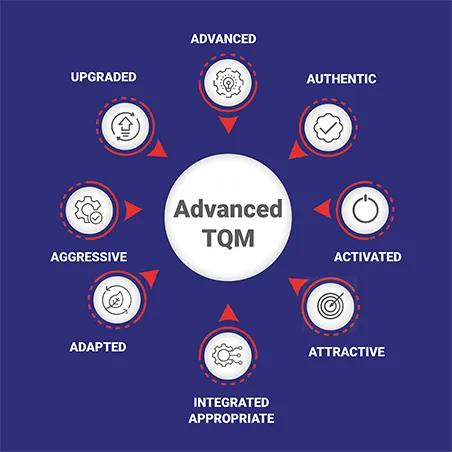
What is SIRI Assessment and How does it help Industry 4.0 Initiatives?
December 8, 2021
The Role of Analytics in Quality Management
December 16, 2021Policy Management and Total Quality Management: Its Evolution And Benefits
Total Quality Management (TQM) is a comprehensive approach to achieve organization’s goal and the larger purpose in the long term while safeguarding the present by providing quality of products and services that satisfy customers at the appropriate time and price through a systematic approach, with the contribution of all the people in the organization.
TQM’s focus is in Big Q that encompasses revenue generation, cost, timely delivery, safety, and morale of people with a focus on quality. TQM approach is different from the conventional approach and hence requires a different way of thinking. Prof. Kaoru Ishikawa, the famous Quality Guru, calls TQM a ‘Thought revolution in management’. By its definition, revolutions are not easy to manage. Ideally, if the leadership is convinced after a thorough understanding of TQM, it can lead to such a change through example. However ideal situations are rare in this world of over 7 billion people where everyone thinks he or she does it the right way.
Obviously, to realize such a goal in a highly competitive environment and ever-evolving customer needs require certain methods. One such method is named Policy Management
What is the purpose of Policy Management in TQM?
The primary purpose of policy management is to safeguard the future of the organization by establishing and efficiently achieving long-term and mid-term business goals while ensuring near-term objectives based on the basic philosophy of the organization.
The Evolution of Policy Management
Policy management evolved from the concept of Management by Objectives (MBO) first used by the famous American management guru Peter F. Drucker in his book entitled “The Practice of Management” published in 1954. MBO was effective and widely used across most organizations around the world until the 1990s. Its popularity grew as organizations using MBO outperformed those who did not use it by a wide margin. MBO was a well-structured and logical approach.
Japanese companies also started using MBO in the 1950s and discovered that while they were able to make a substantial improvement in their performance, they often fell short of the target. Some of the Japanese organizations felt uncomfortable due to this deficiency and found another way that was called Hoshin Kanri, which literally means ‘Management of methodology for setting strategic direction.’ Later on, this was changed to Policy deployment and later again to Policy Management.
The first time I learned about Hoshin was in 1988 when I listened to a lecture by Mr. Shimayamada-san, then Executive Director of Komatsu Ltd. at the first TQC (Later years TQC was changed to TQM) seminar in English in Tokyo organized by the Japanese Union of Scientists and Engineers (JUSE). It was in the context of Komatsu winning the Deming Prize in 1964. Since I had practiced MBO in the past, I was much impressed by Hoshin Kanri approach of Komatsu
Difference between MBO and Policy Management
The main difference is while MBO’s primary focus is on objectives, Policy Management gives greater emphasis to the means to achieve the objectives after having established the objectives using the PDCA approach.
Another differentiator is the alignment of every individual’s objective in the organization with its vision that becomes a great motivator. It requires continual improvement of the Policy Management process based on the experience of the previous year. The reason for this differentiation is that the targets are wish lists while means relate to the activities required to achieve the objective. Many organizations found their own way and collaborated with each other. It was in 1968 when Bridgestone Tire Company won the Deming Prize in 1967, their practice of Hoshin Kari was considered as a shining example and formalized as a system of Hoshin Kanri.
During the same seminar, I visited a company named Yokogawa Hewlett Packard (YHP), a subsidiary of Hewlett Packard (HP), that won the Deming Prize in 1982. YHP started its TQC journey in 1977. Based on the excellent performance of YHP, the parent company HP started a company-wide program of TQM. However, they realized that without effective Hoshin Kanri, TQM will not give the desired objective of 10 times improvement in quality by 1990. HP invited Prof. Noriaki Kano to help them and made it mandatory for all its businesses to use Hoshin Planning, HP’s name for Hoshin Kanri. Gradually, it spread around the USA and later in Europe in the form of Policy Management.
However, Policy Management in its true sense requires considerable rigor, hence considered bureaucratic. At the same time, every organization needs to find its own way based on basic principles of policy management while in a western way. In India, we feel more comfortable if there are standard formats.
After the experimentation in the early 1990s, a book was published on Balanced Scorecard (BSC) by Kaplan and Norton in 1995. Over a period of time, BSC has become an important element of the Strategic Management System. The actual implementation started in the early 2000s and has spread widely across the world. It is basically a deployment of strategic objectives without the rigor of focus on means. This makes it easier to follow but does not seem to be as effective. It creates a balance amongst 4 perspectives of finance, customer, process, and learning. More often than not, in India, the financial perspective dominates.
Policy management is a holistic approach for strategy planning, while BSC can be considered a subset. Some of the Deming Prize-winning organizations in India have found their own way of policy management and used different names for strategy planning while following basic principles of policy management while in the past they followed BSC approach. They have done it successfully.
Typically it takes 3 to 5 iterations of Policy Management cycles of one year each for it to mature and realize its full benefit.





